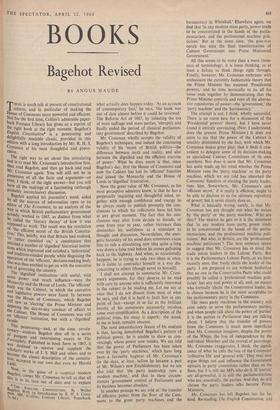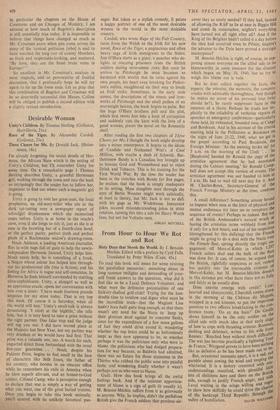BOOKS
Bagehot Revised
B Y ANGUS M AUDE THERE is much talk at present of constitutional reform, and in particular of making the House of Commons more powerful and efficient. Not for the first time, Collins's admirable paper- back Fontana Library has given us a reprint of the right book at the right moment. Bagehot's English Constitution* is a penetrating and delightfully readable classic, provided in this edition with a long introduction by Mr. R. H. S. Crossman at his most thoughtful and provo- cative.
The right way to set about this stimulating task is to read Mr. Crossman's introduction first, then read Bagehot, and then go back and read Mr. Crossman again. You will still not be in Possession of all the facts and arguments—or "en, I think, of the right answer—but you will have all the makings of a fascinating (although Probably inconclusive) discussion. Bagehot applied his journalist's mind, aided by all the sources of information open to an editor of The Economist, to an analysis of the Way in which British parliamentary government actually worked in 1865, as distinct from what be called the 'literary theory' of how it was suPPesed to work. The result was his revelation of the efficient secret of the British Constitu- tion.' This, briefly, was that Britain had evolved, .or rather stumbled on,' a constitution that retained a number of 'dignified' historical institu- tions which impressed and satisfied a 'deferential' and tradition-minded people while disguising the operation of the 'efficient,' decision-making body that was thus enabled to get on with the executive 101) of governing the country. The 'dignified' institutions—still useful, with some power and much influence—were the Monarchy and the House of Lords. The 'efficient' hetlY was the Cabinet, in which the executive and legislative powers were fused. In between Was the House of Commons, which Bagehot still saw as 'electing' the Prime Minister and qePuting the day-to-day conduct of affairs to an Cabinet. The House of Commons was still facade. 'efficient' institution, but with a 'dignified' This penetrating—and, at the time, revolu- ;tarY—analysis Bagehot shot off in a series 15,1 Pungent and entertaining essays in The " "nightly. Published in book form in 1867, it vvas destined to survive and supplant the scholarly works of J. S. Mill and others and to th.1eo Leilome the classic description of the constitu- .aski.accepted in our own day even by Harold ,,D_N'etrry, in the guise of a sceptical modern ,'u,a,as not, comes Mr. Crossman to tell us that all Lib is in its turn out of date and to explain .....L:Not-Isn CONS ril U ION. By Walter man, ,-;6witil an Introduction by R. H. S. Cross- 7s. (Collins, Fontana library. Paperback,
6d.)
what actually does happen today. 'As an account of contemporary fact,' he says, 'the book was out of date almost before it could be reviewed.' The Reform Act of 1867, by initiating the era of mass suffrage and mass parties, 'abruptly and finally ended the period of classical parliamen- tary government' described by Bagehot.
Mr. Crossman wholly accepts the validity of Bagehot's techniques, and indeed the continuing validity of his 'secret of British politics—the difference between myth and reality, and also between the dignified and the efficient exercise of power.' What he does assert is that, since Bagehot's day, first the House of Commons and now the Cabinet has lost its 'efficient' function and joined the Monarchy and the House of Lords in 'dignified' frustration.
Now the great value of Mr. Crossman, as his most perceptive admirers know, is that he has a perpetually inquiring and thoughtful mind, to- gether with enough confidence and energy to be always ready to publish promptly the con- clusions to which his reflections have led him at any given moment. The fact that his con- clusions may alter from decade to decade, or even from year to year, rather increases than diminishes his usefulness as a stimulant to thought and discussion. Nevertheless, the ener- getic fecundity of his mind does sometimes cause him to ride a stimulating new idea quite a long way down a false trail before he comes galloping back to the highway. And when, as occasionally happens, he is trying to ride two ideas at once, he is liable to contradict himself in a way dis- concerting to others (though never to himself). I shall not attempt to summarise Mr. Cross- man's arguments, for they deserve to be read with care by anyone who is sufficiently interested in the subject to be reading me. Let me say at once that I do not dissent from most of what he says, and that it is hard to fault him in any point of fact—except in so far as the brilliant brevity of his summaries necessarily involves some over-simplification. As a description of the political trees, his essay is superb: the wood, to me at least, remains obscure.
The most unsatisfactory feaure of his analysis is that, having demolished Bagehot's pattern of political power, he is unable to show us con- vincingly where power now resides. We are told that the power of Parliament has been taken over by the 'party machines,' which have long been a favourite bugbear of Mr. Crossman's (in the days, at least, before he became a part of Mr. Wilson's new Establishment); but we are also told that 'the party leadership runs a modern machine,' and that in those circum- stances 'government control of Parliament and its business becomes absolute.'
in another passage we are told of 'the transfer of -effective power from the floor of the Com- mons to the great party machines and the
bureaucracy in Whitehall.' Elsewhere again, we find that 'in any modern mass party, power tends to be concentrated in the hands of the parlia- mentarians, and the professional machine poli- ticians.' But at the same time, 'the post-war epoch has seen the final transformation of Cabinet Government into Prime Ministerial Government.'
All this seems to be more than a mere loose- ness of terminology; it is loose thinking, or at least a failure to think things right through.
Finally, however, Mr. Crossman embraces with enthusiasm the currently fashionable theory that the Prime Minister has assumed 'Presidential powers, and he tries heroically to tie all his loose ends together by demonstrating that the Prime Minister controls and runs all the alterna- tive repositories of power—the 'government,' the 'party machine' and the 'bureaucracy.'
The attempt is not, I think, wholly successful. There is no room here for a discussion of the 'Presidential powers' theory, but I have never found it entirely convincing. (Nor, I understand, does the present Prime Minister.) It does not seem to me that the power of the Cabinet is sensibly diminished by the fact, with which Mr. Crossman makes great play, that it finds it con- venient to delegate some of its decision-making to specialised Cabinet Committees of its own members. Nor does it seem that Mr. Crossman has quite made up his mind whether the Prime Minister runs the 'party machine' or the party machine, which we are told has absorbed the
Commons' function of electing the party leader, runs him, Somewhere, Mr. Crossman's new 'efficient secret,' if it really is efficient, ought to be able to disclose to us the ultimate repository of power; but it never clearly does so,
What is basically wrong, surely, is that Mr. Crossman has not thought out what he means
by 'the party' or 'the party machine.' Who are
they? The nearest he gets to it is the statement that 'in any modern mass party, power tends to be concentrated in the hands of the parlia-
mentarians, and the professional machine poli- ticians.' But who, in Britain, are the 'professional
machine politicians'? The next sentence seems to suggest that Mr. Crossman has in mind the trade union leaders in the Labour Party. But it is the Parliamentary Labour Party, as we have recently seen, that freely elects the leader of the party. I am prepared to say without hesitation that no one in the Conservative Party who could possibly be called a 'professional machine poli- tician' has any real power at all; and, no matter who formally 'elects' the Conservative leader, he is chosen because he is the most acceptable to the parliamentary party in the Commons.
The mass party machines in the country still exist solely to serve the parliamentary parties, and when people talk about the power of 'parties'
it is the parties in Parliament they are talking about. I believe that the transfer of powers
from the Commons is much more superficial than Mr. Crossman imagines, despite the power of the Whips, the loss of independence by the individual Member and the revival of patronage.
Mr, Crossman exaggerates, I think, the signifi- cance of what he calls the loss of the Commons' 'collective life' and 'general will.' They may now argue things out and influence the Government upstairs in party committees rather than on the floor, but it is still the MPs who do it. If 'parties' are all-powerful, it is still the parliamentarians who are, essentially, the parties. And they do still choose the party leaders who become Prime Ministers.
Mr. Crossman has left Bagehot too far be- hind. Re-reading The English Constitution, and
in particular the chapters on the House of Commons and on Changes of Ministry, I am amazed at how much of Bagehot's description is still essentially true today. It is impossible to believe that things have changed as much as Mr. Crossman avers when you come across the story of the 'cynical politician [who] is said to have watched the long row of county Members, so fresh and respectable-looking, and muttered, "By Jove, they are the finest brute votes in Europe!"' So excellent is Mr. Crossman's analysis in most respects, and so provocative of fruitful discussion, that I profoundly hope he will try again to tie up the loose ends. Let us pray that this combination of Bagehot and Crossman will be so deservedly successful that Messrs. Collins will be obliged to publish a second edition with a slightly revised introduction.



































 Previous page
Previous page